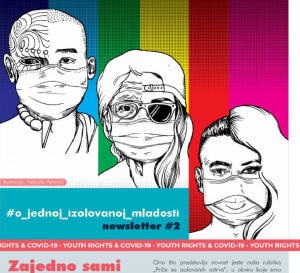The Belgrade Centre for Human Rights (BCHR) hereby alerts the Serbian Government to the detrimental effects of the regulations enacted during the state of emergency and providing for the imposition of misdemeanour penalties against individuals violating the Order Restricting and Prohibiting the Movement of Individuals in the Territory of the Republic of Serbia (hereinafter: Order).
To recall, BCHR is of the view that the Order is unconstitutional, because it does not constitute valid grounds for derogations from constitutionally guaranteed human and minority rights (notably, the right to liberty and security of person and the freedom of movement) and that the Decree on Misdemeanour Violations of that Order provides for violations of the ne bis in idem principle. It therefore reminds the Serbian Government of the legal obstacles to convicting citizens of misdemeanours under the Order.
On 20 March 2020, the Serbian Government enacted a Decree on Statutory Limitations in Court Proceedings Conducted during the State of Emergency. Under this Decree, statutory limitations for appeals of misdemeanour decisions shall not run during the state of emergency, which was declared on 15 March 2020. This means that the statutory limitations for appeals of first-instance decisions convicting individuals of violating the Order will start running only once the state of emergency is lifted. However, pursuant to Article 202(3) of the Constitution, the Decree on Misdemeanour Violations shall cease to be effective when the state of emergency is lifted.
Article 6 of the Misdemeanour Act lays down that misdemeanour offenders shall be tried under the law that was in force at the time they committed the offence, or, in the event it was amended in the meantime, under the law more favourable to them. Therefore, the BCHR is of the view that individuals prosecuted for violating the Order will be exculpated after the state of emergency is lifted. In other words, misdemeanour courts will be unable to punish them and will be forced to discontinue all ongoing misdemeanour proceedings for violations of the Order.
Furthermore, the criteria for determining whether the individuals who violated the Order should be charged with a criminal offence (non-compliance with health regulations during epidemics) or with a misdemanour under the Decree remain unclear given that the elements of these offences are identical, while the penalties they warrant and their other legal consequences differ. This brings into question both equality before the law and legal certainty in criminal law, which the Constitution does not allow even in a state of emergency.
BCHR regrets the inadequate legal formulation of the numerous regulations the Serbian Government has enacted during the state of emergency, which will have grave consequences on the human rights and, ultimately, the budgets of Serbia’s citizens.
 The Belgrade Centre for Human Rights (BCHR) Youth Programme team has published its second Newsletter providing a biweekly overview of the On an Isolated Youth campaign.
The Belgrade Centre for Human Rights (BCHR) Youth Programme team has published its second Newsletter providing a biweekly overview of the On an Isolated Youth campaign. 











